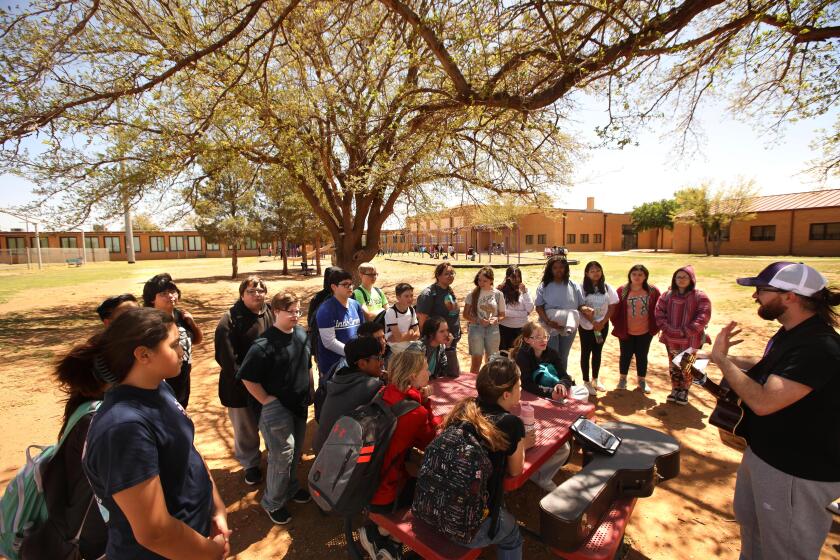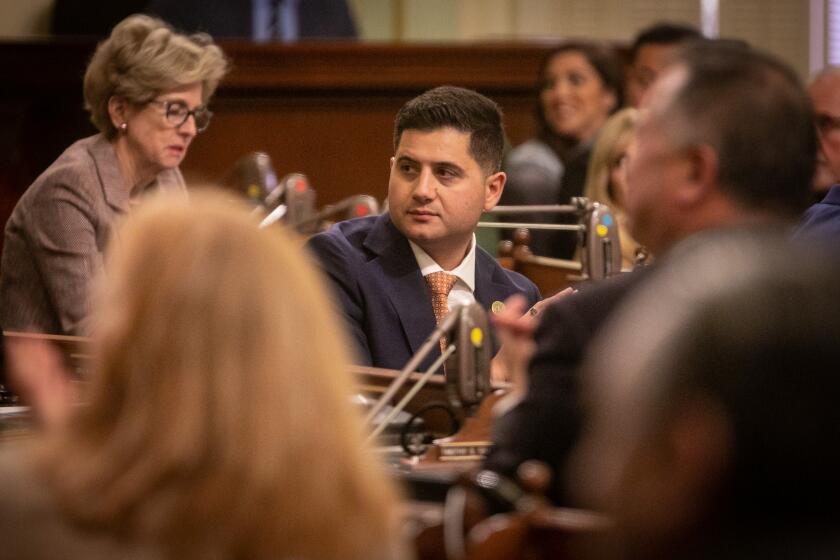Book bans are on the rise in U.S. schools, fueled by new laws in Republican-led states

- Share via
Fearing criminal penalties, public schools throughout Missouri removed hundreds of books from their libraries after state lawmakers last year made it illegal to provide students with “sexually explicit” material — a law that carried punishment of up to a year in prison.
The issue is playing out in public school districts and campus libraries across the United States, 1st Amendment advocates warn: Book bans, gassed up by state legislation pushed by conservative officials and groups, are stacking up at an alarming rate.
In a report published Thursday by PEN America, the nonprofit free speech organization cited 1,477 instances of books being prohibited during the first half of the 2022-23 academic year, up 28.5% from 1,149 cases in the previous semester. Overall, the organization has recorded more than 4,000 instances of banned books since it started tracking cases in July 2021.
At issue is more than “a single book being removed in a single district,” said Kasey Meehan, the Freedom to Read program director at PEN America and a lead author of the report.
“It’s a set of ideas, it’s themes, it’s identities, it’s knowledge on the history of our country — these are the kind of bigger buckets of what is being removed, restricted, suppressed in public schools and public school libraries,” Meehan said.
Conservatives vilify school librarians as “groomers and pedophiles” for stocking LGBTQ and racially themed books. “We have been cursed,” said one librarian.
Forbidden books are largely by and about people of color and LGBTQ individuals, the group found. Of the books removed in the first half of this school year, 30% are about race, racism or include characters of color, and 26% have LGBTQ characters or themes — all at a time when library shelves are becoming more inclusive and representative of society.
The clash over books is not new, but the tactics are changing. Once spurred mainly by concerned parents, book removals are increasingly powered by organized groups, elected leaders and legislation targeting titles that don’t align with their values, PEN America found.
The pandemic helped shift that landscape as schools became entrenched in partisan politics. Groups such as Moms for Liberty, united in its opposition to mask mandates, took aim at curricula and rallied against books it deemed inappropriate for young readers.
School board meetings became arenas for those fights, which spilled onto social media. Some school staffers, particularly librarians, found themselves on the front lines of the intensifying culture wars, facing bullying, harassment and accusations of pedophilia or grooming children due to the literature they offered.
Texas school districts had the highest number of bans in PEN America’s report, with 438 removals. Florida had 357 bans, followed by Missouri, with 315 bans. In Utah and South Carolina, there were more than 100 bans.
State legislatures and courthouses in Republican-controlled states have largely led the charge.
According to PEN America, nearly a third of the book bans earlier this school year were the direct result of newly enacted state laws in Florida, Utah and Missouri. But it’s very likely that the laws, which are often ambiguous, indirectly led to many more effective book bans by creating a “chilling effect,” PEN said. Books have vanished en masse as staffers vet literature to ensure it doesn’t run afoul of the laws.
Republicans are pitching school voucher programs to combat ‘the radical woke agenda.’ But rural Texas conservatives like their public schools just the way they are.
The wave of legislation has drawn challenges. Missouri’s law, enacted in August, is the subject of a lawsuit by the American Civil Liberties Union of Missouri and two state library associations, which argue the law is unconstitutional.
Jamie Gregory, a school librarian in South Carolina, one of the states where bans are most prevalent, said the escalating situation feels like “it presents ... this binary choice” to librarians.
“You either choose to stand by the ethics and the foundation of the profession and defend intellectual freedom rights, or risk your job and your personal safety,” said Gregory, who has done work advocating for intellectual freedom. “I don’t know that a lot of people truly understand what that feels like.”
A law in Florida, which has more book bans than any state but Texas, requires that books be reviewed by certified media specialists, leading some districts to clear out or
hide books in their libraries and classrooms.
Brian Covey said such was the case at his children’s public school in Florida’s Duval County. One Thursday in January, Covey picked up his two elementary school children after a book fair fundraiser. Covey, who worked as a substitute teacher at a nearby campus, said his daughter asked him whether he’d heard about what happened at school that day.
“They took away all the books,” he recalled his children telling him.
Covey, puzzled, asked which books. His children reiterated: all of them.
Classroom shelves were barren or sealed off with construction paper, he said. Schools in the county had launched a formal review of their classroom libraries in accordance with the law and guidance from the state.
“They even went through and took away books kids were currently reading,” said Covey, who tweeted about the issue.
Duval County Public Schools did not immediately respond to requests for comment.
Assembly Bill 1314, which would have required California schools to alert parents if their child is transgender, won’t get a hearing in the Education Committee.
Covey said his daughter called it “wrong” and “rude” to take books away, because some children don’t have them at home or are still learning to read. For a second-grader, she is an advanced reader and would devour books daily, Covey said. But the few books that have made their way back to the shelves after being reviewed are “boring” to her. She now mostly spends her free time hanging out with classmates.
“While I love that she gets time to play with her friends, she loves to learn,” Covey said. “She’d rather be reading books.”
Certain books are frequent targets of bans. Some of the most commonly removed titles last year, according to PEN America, were the graphic-novel-style memoir “Gender Queer” by Maia Kobabe, “The Bluest Eye” by Toni Morrison, “Flamer” by Mike Curato, the graphic novel of “The Handmaid’s Tale” by Margaret Atwood and “Milk and Honey,” a book of poems by Rupi Kaur.
The movement to restrict books is also affecting public libraries.
In Llano County in a rural area of central Texas, officials debated closing the entire library system rather than follow a judge’s order to return 17 challenged titles to its shelves while a lawsuit works its way through court. (County commissioners ultimately decided to keep the library open.)
PEN America’s study echoes a March report by the American Library Assn., which found that efforts to censor library books and resources nearly doubled last year to 1,269 such demands, from 729 the previous year. That marks the most attempts to ban books since the organization began collecting such data more than 20 years ago.
More to Read
Sign up for Essential California
The most important California stories and recommendations in your inbox every morning.
You may occasionally receive promotional content from the Los Angeles Times.

















